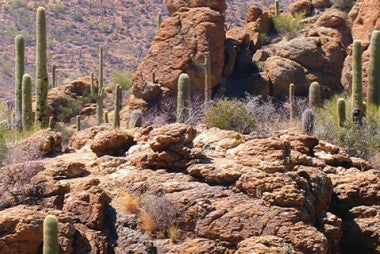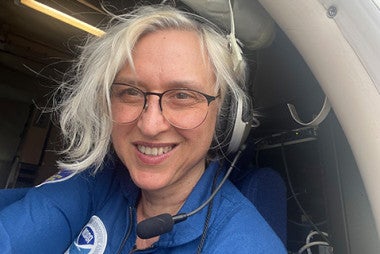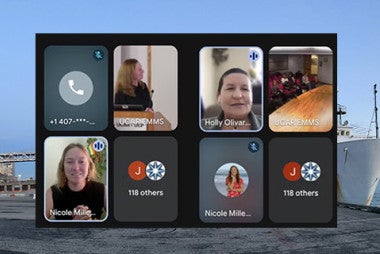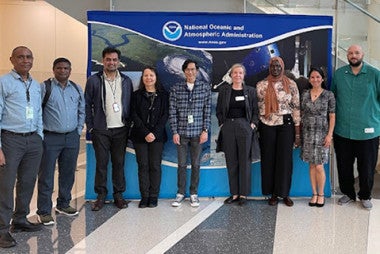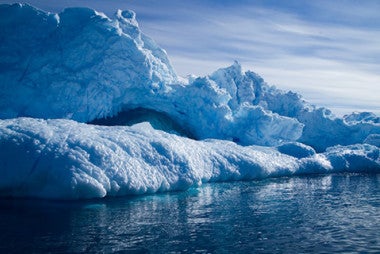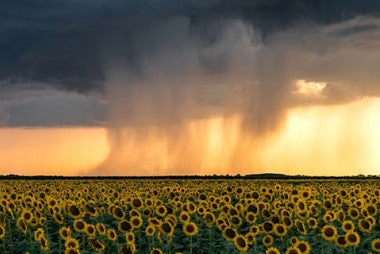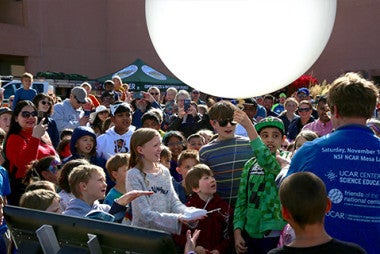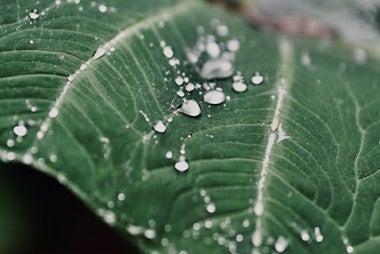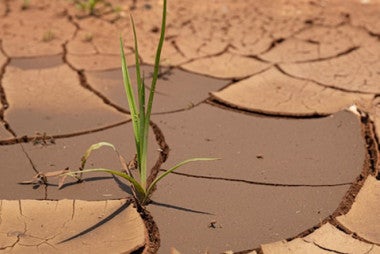NOAA Climate & Global Change Postdoctoral Fellows - Class of 2023
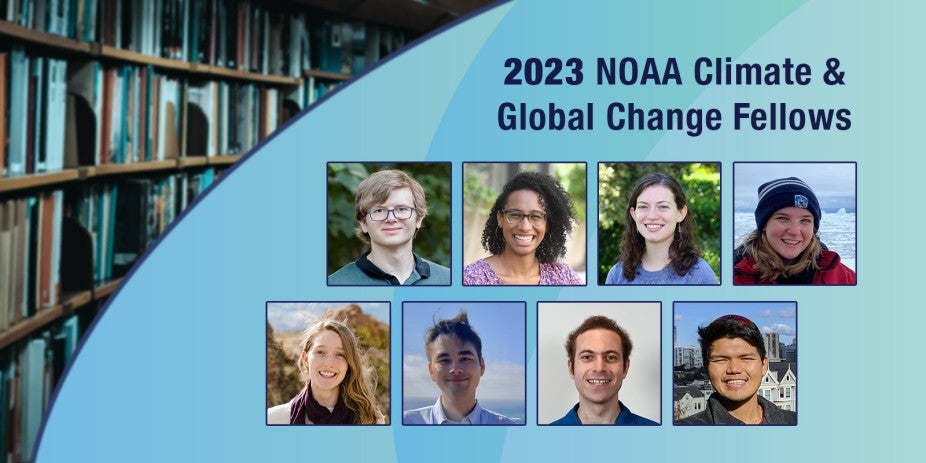
NOAA C&GC Fellows - Class of 2023: Top Row - Aaron Potkay, Arianna Varuolo-Clarke, Clare Singer, Lilian Dove. Bottom Row - Lily Hahn, Makoto Kelp, Noam Vogt-Vincent, Ronnakrit Rattanasriampaipong
Eight new postdoctoral fellows are commencing cutting-edge research projects that will contribute innovative climate science to the research community as well as NOAA’s mission.
These fellows are the new 2023-2024 class of NOAA Climate and Global Change (C&GC) Postdoctoral Fellows, supported by NOAA’s Climate Program Office (CPO) and selected by the University Corporation for Atmospheric Research (UCAR).
“Since 1991, the NOAA Climate and Global Change (C&GC) Postdoctoral Program has been cultivating the next generation of climate and global change experts,” said Wayne Higgins, Director of NOAA’s Climate Program Office. “With this year's class of eight talented fellows, the Program has now sponsored 263 fellows who are collectively helping to build a diverse community of experts in climate and global change research.
Chosen from 72 applications through a competitive review process, the fellows are promising early career scientists who are within five years of completing their PhDs. Over the next two years, the eight fellows will be hosted by mentoring scientists at universities and research institutions around the country to conduct projects focused on observing, understanding, modeling, and predicting climate variability and change.
“The C&GC fellowship provides early career scientists a unique opportunity to pursue cutting edge climate research questions at their institution of choice, while building a network that spans disciplines and geographies with current fellows, former alumni, and NOAA Research,” said Ginny Selz, the NOAA C&GC Postdoc Fellowship Program Federal Liaison and CPO Climate Variability and Predictability Program Manager.
Sponsored by NOAA's Climate Program Office (CPO) and managed by UCAR’s Cooperative Programs for the Advancement of Earth System Science (CPAESS), the NOAA C&GC Postdoc Fellowship Program helps create and train the future leading researchers needed for climate studies. “UCAR | CPAESS is honored to manage the prestigious and critical NOAA Climate and Global Change fellowship. Great effort goes into creating a nurturing bridge between their academic work and that of a career scientist with extensive networking and career development opportunities.” said Hanne Mauriello, Director of UCAR's CPAESS.
The Program was originally founded in 1990 by former CPO Director, Dr. J. Michael Hall, in response to the lack of trained climate scientists to analyze the massive quantity of data collected by the international Tropical Ocean Global Atmosphere Program (TOGA), which ran from 1985 to 1994. Over the past 30 years, the Program has developed an outstanding reputation of attracting the best and brightest PhDs in the climate sciences.
This fellowship traditionally supports two forums where fellows can engage with NOAA and each other— a NOAA Summer Institute every other July, as well as an annual alumni luncheon at the American Geophysical Union (AGU) Fall Meeting in December. The global pandemic, however, required innovation for the Program to continue facilitating interactions between the fellows and the larger NOAA community. Since January 2021, UCAR has hosted monthly virtual seminars featuring presentations by two current C&GC postdocs along with an invited NOAA scientist, or special professional development guest.
During the NOAA Summer Institute program, fellows and alumni come together with the goal of building a stronger global climate change community. The postdoctoral fellows meet each other and more senior scientists in the field over a four-day period. Participants explore the breadth of climate and global change research problem areas, discuss the future directions of climate science research, and discuss the bridge between climate and global change scientific goals and public policy.
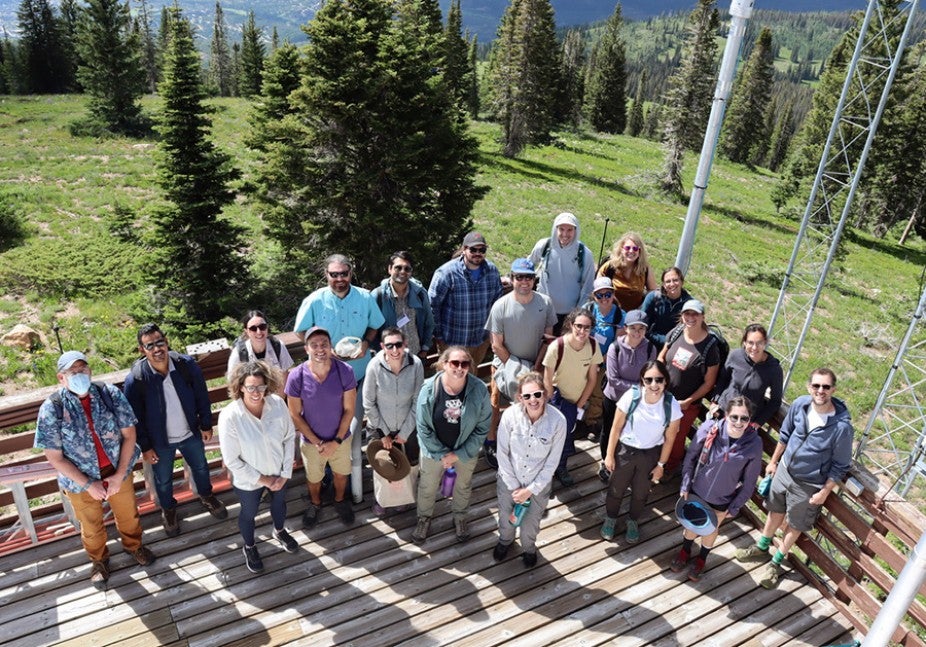
Fellows, alumni, and guest get a tour of the Storm Peak Lab about Steamboat Springs as Dr. Gannet Hallar and her husband explain the atmospheric science conducted at the lab.
The postdocs’ achievements after the fellowship continue to benefit NOAA and the larger scientific community. C&GC fellows go on to serve notable roles in climate science, from the first acting NASA Senior Climate Advisor to academic researchers investigating the submarine melting of glaciers, the atmosphere’s self-cleansing capacity, or the role of atmospheric circulation in the prediction of El Niño and La Niña events.
Many former fellows credit the Program with expanding their independence as scientists as well as supporting their professional growth at a crucial time in their career. For the incoming class of fellows, this means being connected to a network of current and former NOAA postdocs and a community of scientists across a wide range of disciplines related to climate science.
2023 NOAA Climate & Global Change Postdoctoral Fellowship Awardees
Lilian Dove
Proposal Topic: Vertical Density Stratification and Spatial Variability of Submesoscale Carbon Fluxes across the Southern Ocean
Host: Dr. Mara Freilich, Brown University & Dr. Lia Siegelman, Scripps Institution of Oceanography
PhD Institution: California Institute of Technology
Lily Hahn
Proposal Topic: Impacts of the Atlantic Meridional Overturning Circulation on Global and High-Latitude Warming
Host: Dr. Nick Lutsko at Scripps Research Institution of Oceanography
PhD Institution: University of Washington
Makoto Kelp
Proposal Topic: PREscribed Fire Intelligent Recommendation System (PREFIRS): Uncovering the Climate Drivers of Smoke Exposure in the Western United States
Host: Dr. Noah Diffenbaugh, Stanford University
PhD Institution: Harvard University
Aaron Potkay
Proposal Topic: Understanding and predicting forest dynamics under drought and heatwaves: Application of a novel growth maximization theory
Host: Dr. Xue Feng, University of Minnesota
PhD Institution: Rutgers University
Ronnakrit Rattanasriampaipong
Proposal Topic: TEXAS: Towards a full proxy system modeling of TetraEther indeX of Ammonia oxidizerS and reanalysis of temperature trends for the past 100 million years
Host: Dr. Jessica Tierney, University of Arizona
PhD Institution: Texas A&M University
Clare Singer
Proposal Topic: Using observed hemispheric albedo symmetry to understand coupling between clouds and circulation
Host: Dr. Yi Ming and Dr. Pincus at Boston College and Lamont/Columbia
PhD University: California Institute of Technology
Arianna Varuolo-Clarke
Proposal Topic: Investigating drivers of midlatitude precipitation change in a warming world
Host: Dr. Jennifer E. Kay at University of Colorado, Boulder
PhD Institution: Columbia University
Noam Vogt-Vincent
Proposal Topic: The potential for coral reef range expansion
Host: Dr. Lisa McManus, University of Hawai'i at Manoa
PhD Institution: University of Oxford
A sincere congratulations to you all! Learn more about this program and the NOAA | UCAR 33-year-old partnership.
